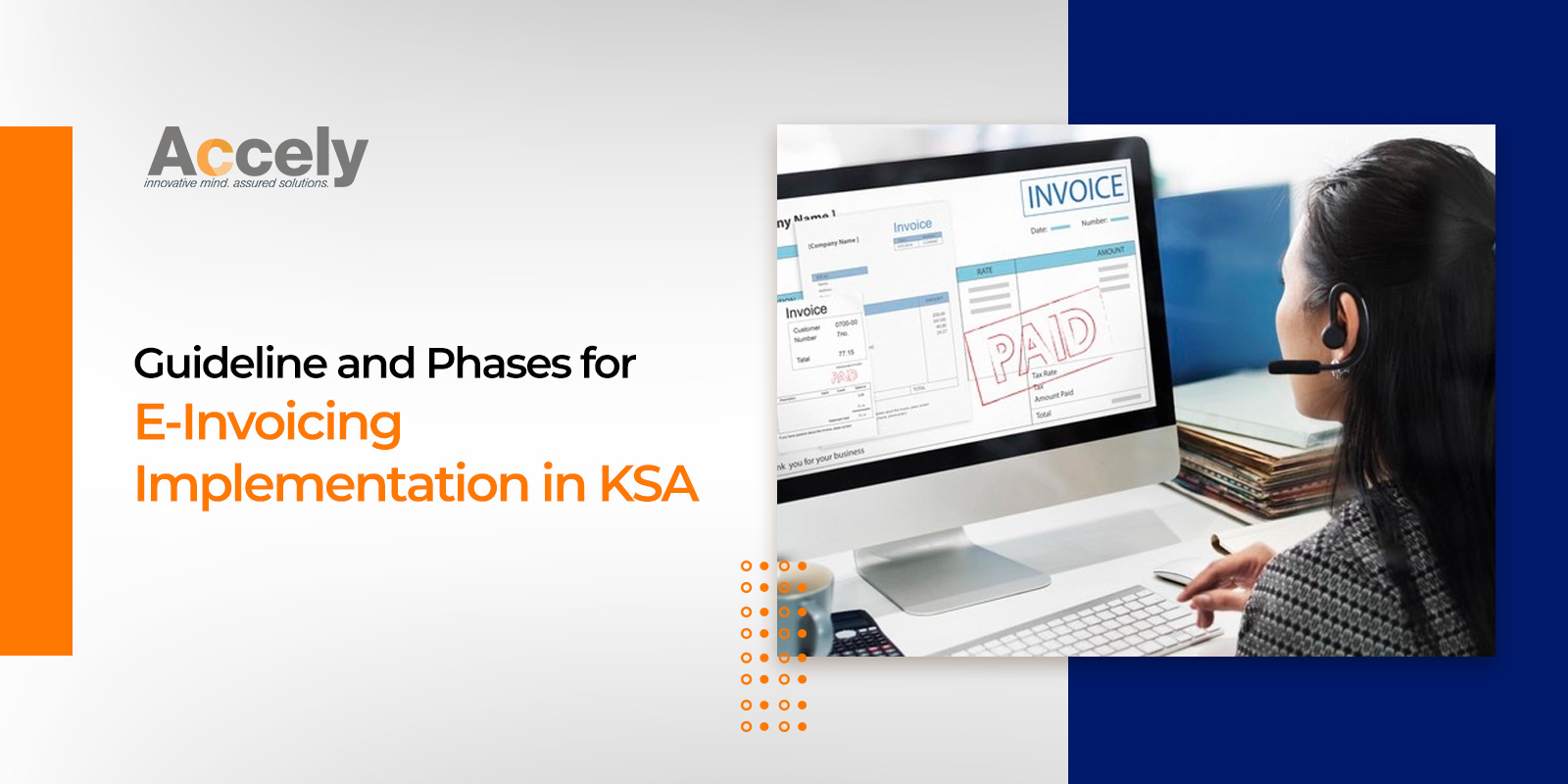Guidelines and Phases for E-Invoicing Implementation in KSA
02-Nov-2021In recent times, the continuous shift of business toward digitalization has been unstoppable. Even the governments of a number of countries are moving towards digital implantation of documents. Among all those electronic documents, E-invoicing has gained pace in the past few years.
After America and Europe, being the early adopters of E-invoicing, now the Kingdom of Saudi Arabia is about to implement E-invoicing and taking steps toward it by the end of this year. In KSA, all the residents’ taxable persons are subject to the electronic invoicing regulation.
This article will talk about the phases and guidelines for the implementation of the E-invoicing system in KSA.
Implementation of E-Invoice in KSA
The implementation of E-Invoice in KSA is going to be rolled out into two main phases in KSA:
Phase I
This phase will be rolled out on 4th December 2021 and is also called the generation phase. This phase is about getting to the bottom of the essential elements that must be met for taxpayers to issue E-invoices. Taxpayers are not required to approve, clear, or report bills to Zakat Tax and Customs Authority (ZATCA) during this time.
The basic points of this phase are:
- Taxpayers should generate and save tax invoices, debit and credit notes, and other documents in a structured electronic format using an electronic solution.
- To generate an E-invoice, the new invoicing system must first be installed and updated.
- Required QR code and invoice title for B2C transactions.
- An optional QR code and mandatory Invoice title are required For B2B transactions.
- Taxpayers will need to update the buyer’s VAT number if they are registered with VAT.
Phase II
Starting in January 2023, this phase will be rolled out in different stages, known as the integration phase. The technical requirement and linkage process will be dealt with in this phase with ZATCA. ZATCA will notify the taxpayers at least six months before the integration date.
The basic points of this phase are:
- In the second phase, the most important part is to link the taxpayer’s system of issuing invoices and notes with the ZATCA system to share the data and information.
- The generation of cryptographic stamps should be enabled for taxpayers for each E-invoice and note (in XML format).
- A Universally Unique Identifier (UUID) will be generated in addition to the
- Installation of certain functionalities which allow taxpayers to save E-invoices and archive them.
- Anti-tampering features will be implemented.
- For the issued E-invoice, a hash will be generated.
ZATCA has also issued some timelines for the B2B invoices that a clearance regime has been prescribed for them; however, for B2C invoices, they need to be reported to the tax authority platform within 24 hours of its issuance.
How Accely helps customers to get aligned with the E-Invoicing regulations of KSA?
Accely’s Accelerated E-invoice solution has been created to manage all of your inbound and outbound e-invoices while allowing for integration with any e-invoicing ERP system in Saudi Arabia.
This invoice solution comes with a number of unique and enhanced offerings keeping in mind the regulations of ZATCA; some offerings are:
- Statutory E-invoice Regulation
This E-invoice solution sticks to all the statutory regulations of e-invoicing laid out by the authorities of ZATCA.
- Support of Professional
This solution offers simplified support integration, aligned with comprehensive information about recent updates or amendments implemented by the authorities.
- Ready to Implement
Smartly customized and ready to use, and seamlessly integrated with any invoicing/billing system based on ERPs.
- Smooth Integration
This solution can easily be integrated with many other solutions that are based on taxation.
- Automatic Cancellation
This invoice solution enables users to generate and cancel the IRN automatically.
- Interactive UI
This e-invoice solution allows users with a similar interactive interface making it very easy and simple to adopt.
Apart from the above offerings, this e-invoicing solution comes with a number of useful features that make invoicing a breeze for everyone.
- Contingency Management
In case of a system failure, this solution enables businesses to carry out usual operations without any disruption.
- Validation
Businesses can use the GAZT’s XML document specifications to validate both issued and received invoices syntactically.
- Invoice Monitoring
Users can track and view the notices or invoices in both XML and PDF formats along with the audit trails in real-time to GAZT.
- Global Transmission
The technology makes establishing a certified and secure link with sixty various tax administrators, covering both B2B and B2C requirements, relatively simple.
- Extraction of Data and its Mapping
In this particular feature, users can detect and map all data based on the ideal XML schema recommended by the GAZT.
Conclusion
Keeping in view all the regulations and guidelines that ZATCA has implemented on invoicing, we at Accely offer you the best E-invoicing solution for KSA. And when it comes to E-Invoicing in Saudi Arabia, it’s best to leave it to the professionals! Accely understands the need of the hour and assists businesses of all shapes and sizes with invoicing solutions. The latest amendments by the Zakat Tax and Customs Authority are understood by our expert integration with the Tax Authority (ZATCA).












